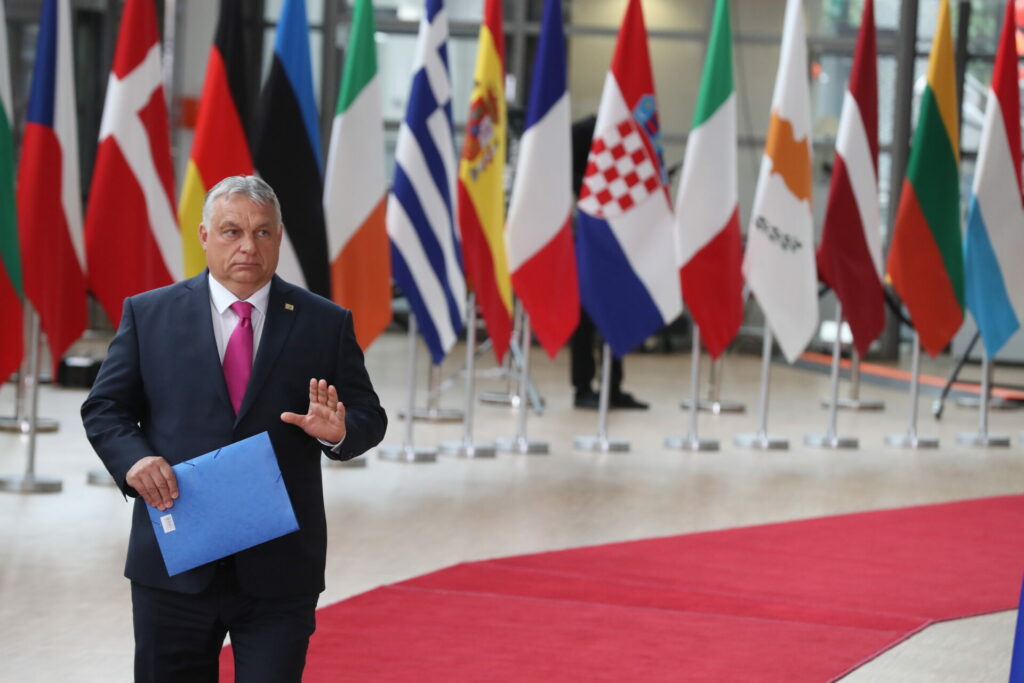The European Commission announced on Wednesday that it had approved Hungary's post-pandemic recovery plan, but that it will withhold any payments – totalling €5.8 billion – until the EU's requested rule of law and anti-corruption reforms are implemented fully and correctly, as they currently "do not go far enough."
Separately, the Commission has also opted to block around €7.5 billion in regular EU funds destined for the Central European country, as part of a mechanism designed for poorer Member States to help harmonise living standards across the EU27.
On Wednesday, the EU chose to stand firm against the nationalist leader Viktor Orbán and the "blackmail" he is accused of, as Budapest is blocking the €18 billion joint aid package to Ukraine, as well as the OECD-agreed minimum tax on multinationals' profits.
"While a number of reforms have been undertaken or are underway, Hungary failed to adequately implement central aspects of the necessary 17 remedial measures agreed under the general conditionality mechanism by the deadline of 19 November, as it had committed to," a press release from the European Commission read.
As a result, the Commission has decided to maintain its initial proposal made on 18 September to suspend 65% of the budgetary commitments for three operational programmes under the EU cohesion policy, which amount to €7.5 billion.
Hungary stands to lose billions in EU funds
The EU Commission has decided to advise the European Council to approve Hungary’s Covid recovery plan – the Recovery and Resilience Plan (RRP) – on the condition Prime Minister Orbán's government implements full and effective reforms on rule of law and anti-corruption – namely 17 remedial measures put forward by the EU, which make up a total of 27 milestones.
"Regarding the rule of law, Hungary has committed to significant reforms. Only once these reforms are implemented in full will access to the EU’s recovery fund be unlocked," stated the Executive Vice-President for an Economy that Works for People, Valdis Dombrovskis.
Related News
- Orban labels EU sanctions on Russia 'a step towards war'
- European Parliament insists EU must freeze Hungary funding
- Orban provokes outrage with controversial 'Greater Hungary' scarf
Concretely, Hungary has been accused of mismanaging EU funds through breaches in public interest rules and cronyism.
Within the EU recommendations on combatting corruption, various measures include targeting persistent conflicts of interest and audit requirements, improving transparency and competition in public procurement, and ensuring the European Anti-Fraud Office (OLAF) can effectively conduct investigations in Hungary.
To strengthen the rule of law and judicial independence, Hungary must increase the powers of the independent National Judicial Council and reform the Supreme Court to limit risks of political influence. Furthermore, they must remove the role of the Supreme Court in acting on questions intended to be referred to European courts, such as the ECJ.

The Hungarian Parliament, Budapest. Credit: Creative Commons
Paolo Gentiloni, EU Commissioner for the Economy, stated that the plan contains important reforms and investments to "green and digitalise" the Hungarian economy, which the EU Commissioner stated will "improve the lives of ordinary Hungarians."
"But let there be no doubt: there can be no disbursements to Hungary unless and until all 27 milestones covering judicial independence and protecting the EU budget are respected. It is thus first and foremost in Hungary’s interest to ensure that this is the case," Gentiloni concluded.
"After years of democratic backsliding in EU member states, the EU Commission is finally making use of its strongest tool: freezing EU money. This in itself is historic. It would have never happened without the relentless pressure from the European Parliament," Daniel Freund MEP for the Greens/EFA group stated on social media.
As of 2021, the EU budget has an additional layer of protection in cases when breaches of the rule of law affect or risk affecting the EU's financial interests.
The Council will now have until 19 December to vote on the matter, requiring a qualified majority for the suspension of funds to enter into force.

